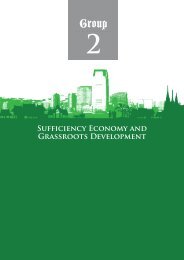Conflict, Legitimacy and Government Reform: Equitable Allocation of ...
Conflict, Legitimacy and Government Reform: Equitable Allocation of ...
Conflict, Legitimacy and Government Reform: Equitable Allocation of ...
Create successful ePaper yourself
Turn your PDF publications into a flip-book with our unique Google optimized e-Paper software.
84 KPI Congress XI<br />
rapid response to the need to establish a curriculum based on democratic<br />
values <strong>and</strong> practices.<br />
In many societies, including the United States, civic education is<br />
contaminated by its association with traditional approaches to<br />
citizenship education that emphasize rote learning <strong>of</strong> national symbols<br />
<strong>and</strong> passive acceptance <strong>of</strong> governmental authority. Clearly, this could<br />
have been a problem for courses inserted into a space in the curriculum<br />
previously occupied by a discredited ideology imposed by an occupying<br />
power. However, Project Citizen because <strong>of</strong> its focus on the involvement<br />
<strong>and</strong> creativity <strong>of</strong> students in the learning process met with enthusiastic<br />
response on the part <strong>of</strong> most teachers <strong>and</strong> students. It did not “preach”<br />
democratic values, but rather showed students, teachers, parents, <strong>and</strong> the<br />
broader school <strong>and</strong> community how these values could be practiced to<br />
solve problems <strong>of</strong> significance to the students.<br />
Latin America <strong>and</strong> the Caribbean. The Latin American <strong>and</strong><br />
Caribbean region was another area experiencing a wave <strong>of</strong> democratic<br />
values <strong>and</strong> practices in the 1990s. In this case the region had not been<br />
subjected to an external ideology, but was emerging from years <strong>of</strong><br />
military dictatorship, authoritarian rule, <strong>and</strong> civil war. Although<br />
democracy had long been a part <strong>of</strong> Latin America’s philosophical<br />
tradition <strong>and</strong> its constitutions <strong>and</strong> formal institutions sometimes aped<br />
Anglo Saxon models, practical politics <strong>of</strong>ten departed substantially from<br />
democratic ideals. Deep social <strong>and</strong> economic inequalities, lack <strong>of</strong> literacy<br />
<strong>and</strong> formal schooling, <strong>and</strong> a tradition <strong>of</strong> corruption by pubic figures all<br />
contributed to an extremely weak democratic political culture. Project<br />
Citizen did not find gaps in an existing curriculum that it could readily<br />
fill. Rather its appeal seems to have been due to the need to provide<br />
concrete examples <strong>of</strong> the practical advantages <strong>of</strong> democracy.<br />
The Project Citizen curriculum faced problems in Latin America<br />
shared with many other cultures in which the language itself cannot<br />
easily express the concept <strong>of</strong> authoritative decisions taken by public<br />
institutions that affect significant numbers <strong>of</strong> people; what we call<br />
“public policy” in the English language. Neither Spanish, Portuguese,














